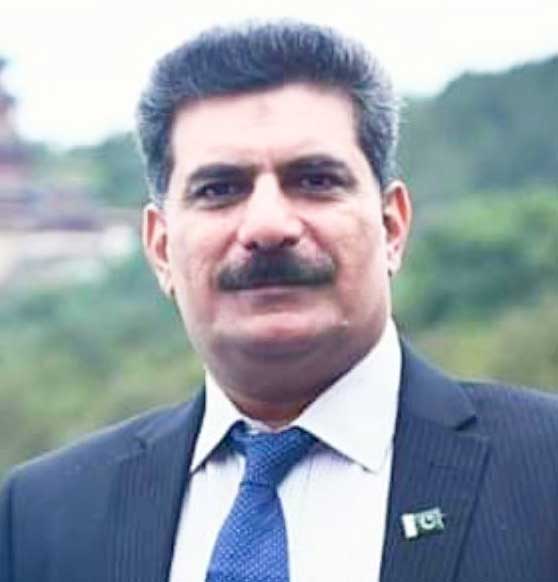Pakistan-China Friendship is a vital strategic asset.
There is no doubt that Pakistan-China friendship is higher than the Himalayas, wider than deserts, sweeter than honey and deeper than the sea. Both friends trust each other and stand by each other in difficult times. Friendship is not diminished by the severity of weather or the barrier of high mountains. The two countries cooperate with each other in every sphere of life, an example of which is the China-Pakistan Corridor.
Pakistan-China friendship has become the most valuable strategic asset of both countries and its roots are rooted in the hearts of the people. The two countries have always maintained a high level of close exchanges. The two countries not only have mutual economic cooperation but have also bonded in defence cooperation for each other’s defence and also have common strategic priorities.
President Xi Jinping said “China and Pakistan need to coordinate security concerns more closely to strengthen security cooperation. The security interests of China and Pakistan are intertwined. Our cooperation in the security and economic fields is mutually reinforcing and should be promoted simultaneously. We need to deepen defence cooperation and enhance coordination and cooperation on regional hotspot issues.”
Pakistan-China friendship has become both countries’ most valuable strategic asset, and its roots are rooted in people’s hearts. The two countries have always maintained a high level of close exchanges. Pakistan’s relations with China have always been very cordial and friendly. The two countries cooperate economically in energy and other important sectors, including defence. Successive governments also continued to travel for social ceremonies between Pakistan and China. Even today, the country’s political parties, leadership and powerful institutions are all on the same page.
The journey of bilateral relations between the two countries that started on May 21, 1951, was not under the illusion that it would not only turn into strategic relations but also cause amazing progress in the economic and social fields. Significant warmth in the relations between the two countries arose after the Sino-Indian border war of 1962. Considering India as its traditional enemy, Pakistan’s leadership has strengthened ties with China to help it emerge as an alternative power in the region to counter Indian influence.
During the Indo-Pak War of 1965, China provided significant assistance to Pakistan, after which the military and economic relations between the two countries intensified. Military cooperation started in 1966. China helped Pakistan stand on its feet in defence production.
In 1984 Pakistan and China signed an agreement on cooperation in nuclear energy. Among the important military cooperation projects between the two countries is the Al-Khalid tank in 2001 fighter aircraft “JF” in 2007. 17 “Thunder”, 2008 in F. 22P frigate and K8.P Karakoram advanced training aircraft and participation in the defence missile program. The forces of the two countries have also conducted several joint military exercises.
When Chinese President Xi Jinping paid a historic visit to Pakistan in April 2015, he emphasized the occasion to expand all kinds of relations. He also emphasized the closeness of military ties and deep cooperation, which was a welcome statement since the two countries have further increased military cooperation. As a result, the military exercise between the two countries was held in 2015. The purpose of this was to promote cooperation in counter-terrorism.
In May 2013, Chinese Prime Minister Li Keqiang visited Pakistan. On this occasion, a joint declaration was issued in which the two countries agreed to further promote comprehensive strategic cooperation on a long-term basis. According to the objectives stated in this declaration, the relations between Pakistan and China are touching new heights of development in every field. In the defense sector, the two countries cooperate in building fighter planes, submarines and tanks. Rather, there is frequent communication between Pakistan and China’s top political and military leadership through government agencies. The three-armed forces of Pakistan and China regularly conduct joint exercises to enhance their combat capabilities and benefit from each other’s experiences.
In November 2020, Chinese Defense Minister Wei Feng paid an official visit to Pakistan. During this visit, the Chinese Defense Minister met Chief of Army Staff General Qamar Javed Bajwa. During the same visit, the MoU was also signed between China’s People’s Liberation Army (PLA) and the Pakistan Army, which aims to promote the relationship between the two countries armed forces to face new threats and challenges in the region.
Another form of cooperation between Pakistan and China in the military sector is joint military exercises between the two countries. In December 2020, the two air forces held joint exercises in Shaheen IX in Sindh province.
Until now, Pakistan has been meeting the needs of its naval and air forces with Chinese weapons, but now Pakistan has also started getting heavy weapons from China for its army. Pakistan has recently inducted the first batch of VT-4 battle tanks from China into its army. Both countries have started promoting economic relations to strengthen the foundation of Pakistan-China friendship.
Along with close cooperation in the military and economic fields, Pakistan and China’s high political and military leadership continue to consult on global and regional issues. The uncertain situation in Afghanistan and South Asia and the involvement of the US in the Indian Ocean strategy against China have made this strategic partnership between Pakistan and China even more important. It is gratifying that Pakistan and China are aware of emerging challenges and threats and taking necessary steps to counter them.
China has supported Pakistan’s three armed forces in various defence sectors. Especially considering Pakistan’s defence needs, “Heavy Mechanical Complex,” Taxila was established. Apart from this, the Tank and Arms Plant was also set up in Kamra with Chinese support, while in 1986, the Heavy Electrical Complex project was started in Haripur. Chinese arms were imported into all three sectors of Pakistan’s armed forces, including Army and naval, surface-to-air missiles, and light and heavy weapons and ammunition.
Not only this, but significant progress was made in the tank industry, and new tank technology, especially the Al-Khalid tank, was developed with Chinese consultation and support. Apart from this, China has helped Pakistan in tank making and aircraft making, due to which Pakistan’s arms industry has developed a lot. China is actively helping Pakistan in various defense projects, due to which China-Pakistan relations are developing double by day and quadruple by night.
Chashma Nuclear Power Plant (CHASNUPP) is a major commercial nuclear power plant in Pakistan, a nuclear power plant producing energy for industrial use. The Chashma nuclear power plant was planned with France in 1973; the site was completed after China joined the project and later supplied the reactor in 1993. In 2017, Pakistan also awarded four Chinese multi-role frigates to the state-run China Shipbuilding Trading Company and HZ Shipyard.
Despite the world’s criticism, significant progress has been made in improving the technology of various missiles with Pakistan-China cooperation. After the US-India Nuclear Technology for Peace Agreement, Pakistan negotiated with China to acquire this specific nuclear technology which was very successful. China also supported the policy of peaceful use of nuclear energy for Pakistan and helped to achieve it.
Established in the 1960s, Pak-China relations have largely been based on military-to-military cooperation. Even now, cooperation in the military sector is the most important pillar of Pakistan-China friendship and the most important basis for close cooperation between the two countries because, at present, Pakistan imports up to 74% of the arms and weapons for its three-armed forces (Army, Navy, and Air Force) from China. Military cooperation between Pakistan and China continues and is being deepened; for this purpose, the military leadership of both countries are in equal contact at the highest level.
A contingent of 75 soldiers from Pakistan arrived in China to participate in the 70th-anniversary parade commemorating the Second World War. The importance of this parade can be estimated from the fact that the heads of 30 countries, including the President of Pakistan, Mamnoon Hussain, participated in this parade and the participation of the Pakistani contingent in this parade was no less than an honour.
The Chinese border with Pakistan is considered to be the most secure of all the other borderlines. China-Pakistan relations have always been based on the principles of peaceful coexistence, strategic interests and common goals. Sharing common strategic interests facilitates alliances free of military and political confrontation.Pakistan-China Friendship
The special importance of China’s cooperation in making Pakistan’s defences invincible and complete, cannot be ignored. This cooperation covers other areas as well, and recently Pakistan has entered an era of economic development where Pakistan needs China more than ever, and the two countries seem closer to each other. Such a long and warm period of relations between any two neighbouring countries is unusual. But here it reflects that the Pakistan-China friendship will continue to cover one sector after another.







